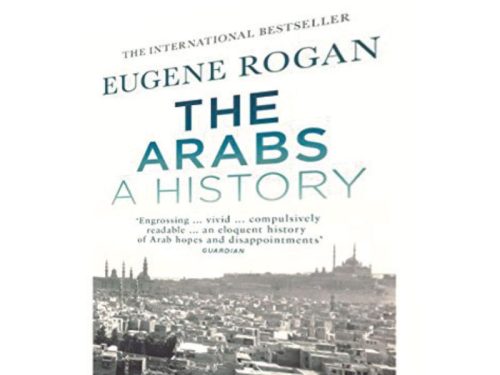No products in the cart.
Tragic history: The Arabs: A History
The deep yearning for unity, justice and freedom of Arab people united by religion has invariably been thwarted in The Arabs: A History, writes Dilip Thakore
The Arabs: A History
Eugene Rogan
Penguin Random House
Rs.899
Pages 718
Although an estimated 7.6 million Indian citizens and people of Indian origin are employed throughout Middle East countries, especially in the Gulf Emirates and Saudi Arabia, in India there is hardly any awareness or knowledge of the history of the Arab world. Syllabuses and national curriculum frameworks designed by faux academics have ensured that despite our geographical contiguity and commerce and intellectual linkages dating back several millennia with Arab countries, there’s almost no real sense within the general populace of the tumultuous history of this volatile region, despite the God-gifted crude oil reserves of the Middle East being of vital importance for growth and development of the Indian economy.
Therefore this book, first written in 2009 by Eugene Rogan, professor of Middle Eastern history at Oxford University (UK) and updated in 2018, is highly recommended to students of geopolitics, economists, businessmen and media pundits who often make ill-informed references to Arab politics in lectures and essays.
After reading this brilliantly researched history drawn from a bibliography rich with Arab sources, documentation and narratives — the author is evidently fluent in the language — one can’t help but conclude that never in global history have a people united by one religion and a common language, been so wronged.
Even if during the past half century, providence has compensated them — or at least their rulers — with vast fortunes flowing from crude oil reserves buried beneath burning, unyielding desert sands, the essential tragedy of the Arab people is that their deep yearning for unity, justice and freedom has invariably been thwarted by the machinations of 20th century European colonial powers, and also by their own narrow-minded clergy and autocratic leaders.
The golden age of Arabs was the five centuries after establishment of Islam as the dominant religion of Arabia in 700 CE (current era). But the golden age of Arab empires ended in 1453 when the Ottoman Turks of Balkans and central Asian ethnicity captured Constantinople, the last major Christian stronghold in Asia. After that, Turks who renamed Constantinople as Istanbul, ruled Arabs for “four of the past five centuries”.
Turkish rule over Arab satrapies came to an end when the Ottomans chose to ally with Germany in World War I (1914-18). After the war, the victorious European allies — Britain and France in particular — recklessly redrew boundary lines and lorded over old and newly created Arab sultanates of the Middle East and North Africa.
The imperious recklessness with which colonial powers of the early 20th century redrew regional boundaries and established monarchies and governments in the Arab world, have had repercussions for over a century and have kept the Middle East and Arab people in a state of disequilibrium ever since.
In 1921, the British carved Jordan out of Palestine to reward Sheikh Faisal who had been a loyal anti-Turkish ally in World War I. Worse, without adequate debate and deliberation, in 1917 the British government made the Balfour Declaration in “favour of the establishment in Palestine of a state for the Jewish people… it being clearly understood that nothing shall be done which may prejudice the civil and religious rights of existing non-Jewish communities in Palestine…”.
This inherently contradictory declaration opened the floodgates of mass emigration of European Jews who had suffered continuous discrimination and persecution in European countries for centuries, into Palestine. Especially after the Second World War during which Germans attempted mass extermination of European Jews. As a result, a non-Arab essentially European nation was established in the Middle East and as recounted in considerable detail in this rigorous history, native Arab Palestinians have been driven out of that country.
The consequence has been persistent warfare and instability in the Middle East where the Jewish state of Israel, armed to the teeth by the US and the West, has won three wars and the issue of awarding even a sliver of territory to native Palestinians to call their own is yet to be resolved. Meanwhile following weaponisation of the immense crude oil reserves of Saudi Arabia and several Arab countries grouped under OPEC (Organisation of Petroleum Exporting Countries), globalisation of the complex struggle for a Palestinian state through terror networks, and the futile struggle of the Arab masses to free themselves of their oppressive clergy and dictatorships, has profoundly impacted global geopolitics.
The merit of this wide-ranging narrative is that it includes concise histories of all nations of the Arab world. And the threads of these narratives have been skilfully drawn together to make a strong case for greater empathy for the much-misunderstood Arab people.
It’s mandatory reading for all wanting to understand the mad, mad contemporary world.















Add comment